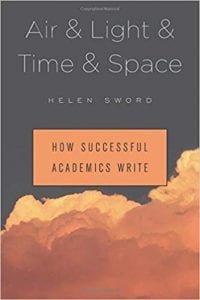Time & Space & People & YouTube
(by Elisabeth Meyer, Senior Research Associate, School of Physiology, Pharmacology & Neuroscience)
What makes academic writing challenging? Helen Sword captures a multitude of answers to that question from real-life scientists in her book ‘Air & Light & Time & Space’. She interviewed well-established academics in their field as well as grad students, post-docs and early career researchers to present a book in which scientists are given the chance to describe their strategies, their coping mechanisms and their motivations when writing. The sheer amount of individual experiences makes this book a multi-faceted reservoir of ideas and inspiration for the aspiring writer.
The first two parts of the book deal with rather classic writing advice, such as how to find the ever-elusive time to write, or to pick up a book about English grammar now and again. While these sections can hardly be expected to yield any novel insight, I nevertheless appreciated to read that instead of desperately trying to bash out 1000 words before the sun comes up, I’m being encouraged to find my own way of staying motivated and productive. Suggestions range from simply listening to music or watching penguins on YouTube (adorable) to engaging with fellow academics and/or writers in order to build up a solid support structure of people who are willing to offer constructive criticism or even just a shoulder to cry on over a glass of wine.
The last part of the book is dedicated to the emotional side of writing: How does the writer deal with the inner editor, with critics or inevitable rejection? Reading about established scientists receiving harsh rejections has put my personal experiences with reviewers in perspective. Additionally, she quite rightly calls out the serious lack of formal writing training for academics, since writing advice currently is mainly offered by mentors or colleagues volunteering their time and expertise.
Helen Sword has produced a very useful book jam-packed with inspiring stories about successful academic writers and their habits. And while no book will unlock a magic strategy that will suddenly make beautiful words effortlessly flow from the academics’ fingertips, this one might just give you the right idea about how to bring time and space and people (and maybe YouTube) back into your academic life to kickstart your writing project!


